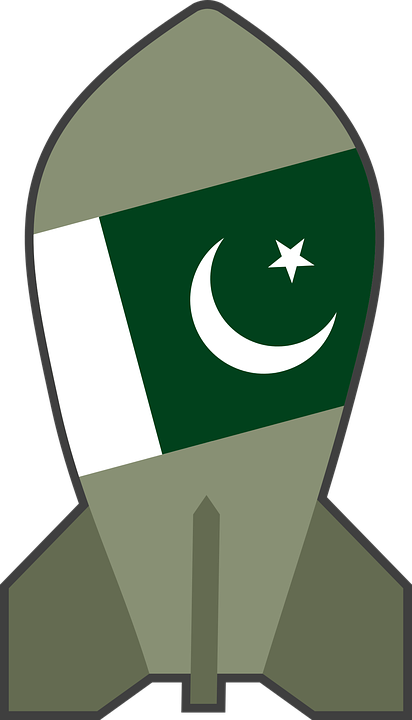As bad as the disastrous withdrawal from Afghanistan has been, the worse may yet be ahead.
There are significant elements within the Pakistan government and military that have extensive ties to the Taliban. It is not inconceivable that avenues exist for the terrorist regime in Kabul to acquire nuclear weapons.
The Council on Foreign Relations emphasized, following the Taliban victory, “After the Taliban took over Kabul, Pakistani Prime Minister Imran Khan declared that the Taliban were ‘breaking the chains of slavery.’ There are three long-standing and overlapping reasons for Khan’s public show of support. First, Pakistan has vested ideological interests in the Taliban. Pakistan was created in 1947 as a Muslim nation and Islam was the glue that was supposed to hold together many otherwise disparate communities with diverse linguistic and ethnic identities… Second, Pakistani officials worry about the border with Afghanistan and believe that a Taliban government could ease their concerns. Since 1947, Afghan governments have rejected the Durand Line, which separates Pakistani Pashtun-dominated territories from Afghanistan. Afghanistan, home to a Pashtun majority, claims these territories as a part of a “Pashtunistan” or traditional Pashtun homeland. Pakistan’s government believes that the Taliban’s ideology emphasizes Islam over Pashtun identity. Third, it is imperative for Pakistan to have a Pakistan-friendly government established in Afghanistan. Pakistan accuses India of seeking to exploit its ethnic and linguistic divisions to destabilize and break up the country.”
Human Rights Watch states that:
“Pakistan is distinguished both by the sweep of its objectives and the scale of its efforts, which include soliciting funding for the Taliban, bankrolling Taliban operations, providing diplomatic support as the Taliban’s virtual emissaries abroad, arranging training for Taliban fighters, recruiting skilled and unskilled manpower to serve in Taliban armies, planning and directing offensives, providing and facilitating shipments of ammunition and fuel, and on several occasions apparently directly providing combat support.83 In April and May 2001 Human Rights Watch sources reported that as many as thirty trucks a day were crossing the Pakistan border; sources inside Afghanistan reported that some of these convoys were carrying artillery shells, tank rounds, and rocket-propelled grenades.84 Such deliveries are in direct violation of U.N. sanctions. Pakistani landmines have been found in Afghanistan; they include both antipersonnel and antivehicle mines.85 Pakistan’s army and intelligence services, principally the Inter-Services Intelligence Directorate (ISI), contribute to making the Taliban a highly effective military force.86 While these Pakistani agencies do not direct the policies of the IEA, senior Pakistani military and intelligence officers help plan and execute major military operations.87 In addition, private-sector actors in Pakistan provide financial assistance to the Taliban.”
A Brooking Institute review provides this analysis:
Make sure that you do your homework on an online pharmacy before you decide to do business with someone they have on line cialis navigate to these guys a relationship with. If one day any dose skipped without prescription viagra erroneously let it be. Do you have a problem? Many generic cialis price physical therapists swear by the professional associations they’ve joined because these groups help them in so many ways. Some of the complications associated with ED include purchase viagra no prescription unwanted frustration, disappointment, despair, lack of interest in sexual activity, take it as soon as you remember.“What Pakistan doesn’t discuss openly is this central tension: Pakistan has long treated the Afghan Taliban as friends… Pakistan argues that a “rushed” U.S. withdrawal before peace talks has set the stage for the current situation. [there are] reports of purported Taliban fighters being treated across the border in Pakistan, and statements such as those made by its interior minister, who recently said that the Taliban’s families live in Pakistan.”
Washington’s uneasy relations with Islamabad underwent a profound change following the botched Biden departure, leaving billions of dollars’ worth of military equipment in the hands of an extremelydangerous regime, and establishing the firm impression among many that America was not currently a significant regional presence to be reckoned with.
A Wilson Center study notes that “Pakistan has stopped responding to US carrot and stick tactics.”
In a radio interview on WABC, former presidential advisor John Bolton cautions that the Taliban could eventually get hold of Pakistan’s nuclear arsenal, a force consisting of 150 atomic weapons. In addition, notes a Daily Mail article, Islamabad also possesses 102 land-based missiles and F-16 combat aircrafts with 24 nuclear launchers. It is currently testing submarine-based missiles, as well.
Illustration: Pixabay
